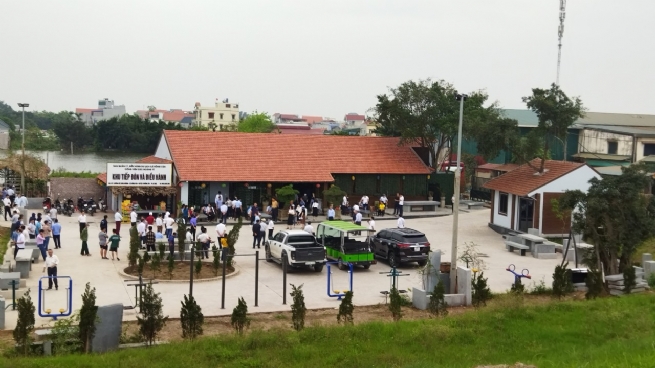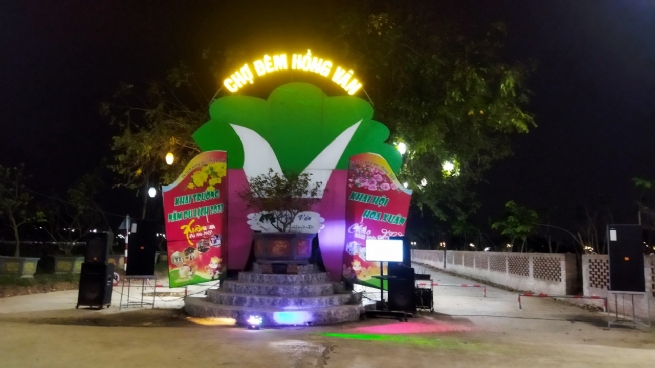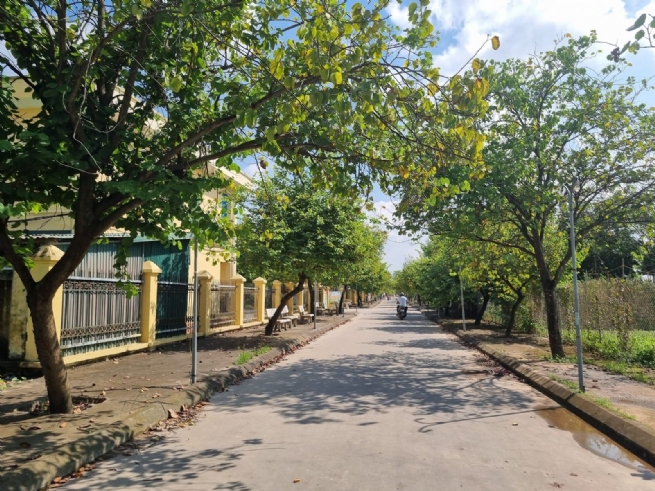Building agricultural tourism spots, developing local strengths, and attracting the active participation of people in developing agricultural tourism are considered highlights in socio-economic development, contributing significantly to the National Target Program on New Rural Development in Hanoi.

Hong Van rural tourism spot, Thuong Tin district
Developing local strengths
Implementing Program No. 04-CTr/TU, dated March 17, 2021 of the Hanoi Party Committee on "Promoting the effective implementation of the National Target Program on new rural construction associated with restructuring the agricultural sector and developing the rural economy, improving the material and spiritual life of farmers in the period of 2021 - 2025", Hanoi identifies the development of agricultural tourism towards sustainable rural construction, going into depth as an important and strategic task. Vice Chairman of the City People's Committee Nguyen Manh Quyen emphasized: "Hanoi will issue a plan to develop agricultural and rural tourism economy associated with new rural construction in the city for the period of 2021 - 2025; policies to attract businesses to invest in developing agricultural and rural tourism; promote and preserve cultural values; support training for people to do tourism... Thereby, creating conditions for rural tourism to develop, becoming an OCOP product (Each commune, ward, one product) of the city". Hanoi Department of Tourism also drafted a Plan to develop agricultural and rural economy associated with new rural construction in the city for the period of 2021 - 2025, in order to create favorable conditions to promote the development of agricultural tourism economy.

Located in Thuong Tin district, Hong Van, from an agricultural commune, has now developed in the direction of a bonsai craft village combined with exploiting experiential ecotourism services. With a creative approach, each year Hong Van commune welcomes nearly 60,000 visitors to experience tourism, with an estimated income of over 6 billion VND/year. In 2018, Hong Van commune was recognized by Hanoi as an eco-craft village tourist destination. This is an important milestone for the government and people of Hong Van commune to continue promoting the development of ecological agriculture associated with new rural construction. The Resolution of the 26th Congress of the Party Committee of Hong Van commune, term 2020 - 2025, determined to build the commune into a "tourism - ecology - craft village" commune, striving to make Hong Van a key regional connection center and an attractive tourist destination of the capital by 2025.
Secretary of the Party Committee of Hong Van Commune Nguyen Hai Dang said that the commune is trying to become an attractive destination for tourists; making trade - tourism a key economic sector in local economic development.

Vinh Ngoc Commune, Dong Anh District is a locality in the planning of new rural construction oriented towards organic agriculture development associated with ecotourism. The model of organic grape growing combined with local ecotourism is one of the successful models in recent times. Taking advantage of the advantages of agriculture, transportation and tourism, the Farmers' Association of Vinh Ngoc Commune has established a professional grape growing association consisting of five members with a scale of nearly 5 hectares. Visitors coming here can experience the stages of planting, caring for and harvesting grapes with a safe production process. With two harvests a year, the expected grape output is from 50 to 60 tons/year, the selling price of 200,000/kg will bring a significant source of income for farmers. The model not only develops the agricultural economy, increases farmers' income, but also creates ecological space between urban areas. According to the Central Office for New Rural Area Coordination, there are currently about 584 agricultural and rural tourism models operating nationwide, concentrated in the Northern mountainous areas and the Mekong Delta; of which 382 tourist destinations in rural areas are recognized by the Provincial People's Committee. Some models are developing strongly in localities, such as: Nam Hong village community tourism (Thong Nguyen commune, Hoang Su Phi district, Ha Giang province); Hello Mu Cang Chai community tourism site (La Pan Tan commune, Mu Cang Chai district, Yen Bai province); Kon Ko Tu community tourism cultural village (Kon Tum city, Kon Tum province); tourist destination: Southern Folk Music Memorial Area (Bac Lieu province)...
Chief of the Central Office for New Rural Area Coordination Ngo Truong Son said that the Ministry of Agriculture and Environment has instructed localities to focus on propaganda work, raising awareness among people; building models for developing agricultural and rural tourism suitable to the strengths and advantages of the locality. The Ministry has also approved a list of 20 pilot models under the Rural Tourism Development Program in building new rural areas in 20 provinces, focusing on the orientation of building models for developing agricultural and rural tourism associated with agricultural production, craft villages, preserving and promoting cultural values and protecting the environment, rural landscapes...
Developing tourism in association with preserving traditional culture
Despite its great potential, Hanoi's rural tourism still faces many challenges. First, spontaneous development and lack of planning have made many tourist destinations unable to exploit their advantages; local tourism development is still low, and tourism products have not been clearly defined. In addition, infrastructure in rural areas is not synchronous, lacking standard accommodation services and convenient means of transport. Although people have rich experience in agricultural production, they lack the skills to serve tourists professionally.

Another problem is the lack of a distinctive tourism brand. While localities such as Da Lat or Sa Pa have built their own image of agricultural tourism, Hanoi still does not have products that are competitive enough to attract tourists.
According to the Ministry of Agriculture and Environment, agricultural and rural tourism activities still face many difficulties and limitations. Planning for agricultural and rural tourism is still lacking in focus and is not suitable for the potential, advantages and characteristics of many localities. Many rural tourism models are still spontaneous, fragmented, small-scale and duplicated. Tourism products are still monotonous, not unique, spontaneous and seasonal. Connecting and linking tourism points and routes is still limited, especially inter-provincial and inter-regional connections... In the orientation of building new rural areas in the period of 2026-2030, the Ministry of Agriculture and Environment continues to overcome difficulties and limitations; at the same time, promoting tourism development associated with preserving traditional culture of villages. At the same time, research and develop models connecting traditional culture with new cultural creation, ensuring diversity and regional characteristics. In addition, focus on applying digital technology in the work of preserving and digitizing heritage documents, developing a platform to promote rural cultural tourism. Enhance the economic value of heritage and create livelihoods for people through community tourism and rural experience tourism. Encourage the development of unique tourism products associated with culinary culture, traditional crafts, and folk arts, contributing to building the brand of Vietnam's rural tourism. According to the Office of the Coordination of the New Rural Development Program of Hanoi City, the city continues to promote the value of heritages, relics and craft villages, enhancing the added value of tourism products in the capital city of Hanoi. Currently, the Hanoi Department of Tourism has built and announced the central tourist route Hanoi - Thanh Oai - Ung Hoa - My Duc, with the theme "The Heritage Road of Nam Thang Long - Hanoi - A place to return to the roots" associated with the journey to visit, learn, and experience the activities of Noi Binh Da communal house (Binh Minh commune, Thanh Oai district) and Chuong conical hat craft village (Phuong Trung commune, Thanh Oai district); incense stick craft village (Quang Phu Cau commune, Ung Hoa district); weaving village (Phung Xa commune, My Duc district).
For the Western region, Hanoi has built and announced the "Community tourism destination of Mien village", Ba Vi commune, Ba Vi district with the theme "Healing - Calming the mind - Nourishing wisdom" associated with learning about indigenous culture and traditional medicine making of the Dao Quan Chet people, Ba Vi commune...

Developing rural tourism associated with new rural construction is not only an economic development strategy but also a sustainable solution to preserve culture and improve people's lives. With its existing potential, Hanoi needs to continue investing in planning, upgrading infrastructure and building a clear tourism brand. If implemented synchronously, agricultural and rural tourism will become an important driving force, making the capital a bright spot on the tourism map of Vietnam and the world.
By Minh Ngoc, Vietnam Business Forum
| This special section is supported by Hanoi Coordination Office of the New Rural Development Program |